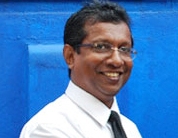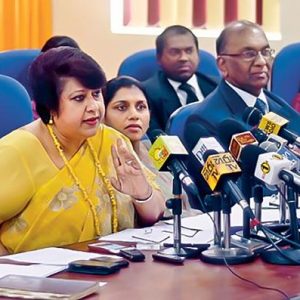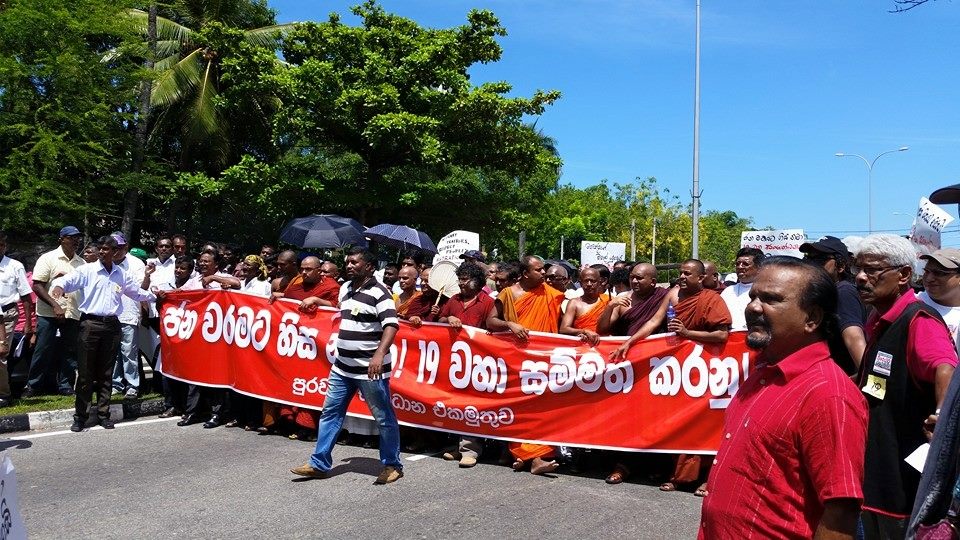Image: One of the biggest demonstration calling for democratic reforms was headed by late Rev Maduluwawe Sobhitha threo after the new govt was elected.
Interview with J. C. Weliamuna.
President Maithripala Sirisena’s comment during a speech at ‘Sathviru Heritage’ function at the Sri Lanka Foundation Institute (SLFI) organized to transfer ownership of houses and properties to the security divisions on October 12 and the subsequent events which included the resignation of Bribery Commission’s Director General Dilruskhi Dias Wickremasinghe created a quiet a stir in the political and civil circles. The most shocked sections were the members of the civil rights groups who worked tirelessly even with a risk to their lives to bring President Sirisena to power. Dailymirror spoke to widely respected human rights lawyer J. C. Weliamuna, one of the leading activists who worked to defeat the Rajapaksa regime on January 8, 2015 about the after effects of the President’s speech and reaction of the civil society groups. Excerpts;
Q When you look back do you feel happy about the change that took place on January 8, 2015?

We are quite satisfied but the civil society would not be fully satisfied. There are huge positive steps in the direction of democracy. And we had a few things that we struggled to achieve such as the 19th Amendment. Then we have the Right to Information Act. There are a large number of changes in overall governance factors. But there are also areas where we have serious concerns. Overall I would say there no reason to be unhappy.
Q Does that mean you don’t have any regrets in working to bring Yahapalanaya government?
No.
Q As someone who worked hard to bring defeat to the former regime, how do you see the speech made by the President recently? Does the content in that speech contradicts some of the promises made when this government came into power? Does the speech challenge the most important concept of good governance and separation
of powers?
In my view the speech was ill advised. No question about it. I believe when the Head of State speaks, it could be subjected to different interpretations. But we have to understand that the people are also intelligent and they have their own interpretations. So that is why there are lot of stories about leaders speaking anywhere in the world. Even if a head of state wants to withdraw or tender an apology, that will have lot of ramifications. We have to understand that it was a leader’s speech. As I said earlier, it was ill-advised. There may be reasons for it, but it was ill-advised in the sense that January 8 victory or change was mooted by the civil society and the people in the Opposition and there were also certain basic changes people wanted. Those basic changes were the rule of law, democracy and civilian rule. We wanted to have reconciliation and on the whole a decent society. Those are the changes we wanted. One interpretation is whether the speech has challenged those co-values. That is why the civil society is agitated. It has a right to be agitated. It has contributed to the change.
In my view, there are three forces that had made the change. One was the political force, particularly the UNP, Chandrika Bandaranaike Kumaratunga and all the smaller political parties which nominated the common candidate. That was from the political force.
Secondly, the civil society force. I think they were the section which mooted the idea, particularly late Ven. Sobitha Thera. Thirdly, the peoplle. They wanted a change because what took place in the Rajapaksa era was horrendous. I mean the murders, the abductions and so on…
Q. Are you referring to what took place during the war?
I think the post-war era was worse than the war era, because if we look at the post-war era, it was a consolidated effort. The Rajapaksa family tried to consolidate its power and ruined the democratic institutions. They had the golden opportunity to make this country a heaven. Instead, they did everything possible to consolidate power and made Sri Lanka a corrupt State.
Q. Did the civil society groups which worked for the victory of President Sirisena have any agreement prior to the election?
There was a common agreement among these forces, be it written or unwritten. Among them were re-establishing democracy, the rule of law and fighting corruption. I think the civil society must have felt hurt.
Q. You repeatedly said that the President’s comments were ill-advised. Does that mean that his comments were not spontaneous but pre-planned?
Why is the civil society overall supporting the government? That is for a common agenda. They want some major reforms. So long as reforms are intact, I have no doubt the civil society would criticize but would support the government. We still feel we could move the reform agenda. So, when this type of situation arises, we must understand that this is a coalition government. No unity government could work without issues. These are the two different ideologies of different political leaders. So when we look at the practical aspect of it, the reform agenda to be achieved and delivered with one pre-condition, that is the UNP and UPFA leadership, I would narrow it down to the President and the Prime Minister must read the same language. But one could see these political leaders are pressurised by people with vested interests, political interest and private agendas. What we must understand is that the civil society is closely monitoring these two.
I have no doubt that there are so many factions which want to create a split and we want to make sure at least the civil society as well as I, will do everything possible within the circle of my civil power to ensure these two stick together. That is not because of the love for them but because without that we cannot achieve the reform agenda. It has to be achieved. With the 19th Amendment, parliament cannot be dissolved for four and-a-half years. Political stability is important though at present it seems to be a little chaotic.
Q. Once this government came in to power lot of attitudanal changes took place among the international community with regard to Sri Lanka. How will the President’s comments be read by the international community? Doesn’t this statement affect the country?
Unfortunately you are right. That is why I said when the politicians talk, there are multiple ramifications. They are interpreted by local actors, politicians within and outside parliament and the international community. It was US President Eisenhower who said “As a leader I knew only one thing, that is my strength. I knew what and what not to talk”. Eisenhower was one of the greatest leaders ever. He was a General during the World War II. If he started talking about secrets of the war and all that what would have happen to America? That does not mean that you should not use your strength to streamline the organization. That is a different mechanism. I still think that these ramifications can be addressed if the President and the Prime Minister are serious about it.
Now I heard about another discussion going on among some intellectual groups, including a few foreigners. They were referring to three criminal investigations into abduction and killing of journalists and trying to say that the suspects were serving in the military. Because they were war heroes, and investigating them would tarnish the country’s image in the international arena. I really don’t know which way it would progress. I only hope it will not go out of proportion. Because we all want this country to be back on the track, at least where good governance is concerned.
On the other hand, after a long pause, Sri Lanka has been politically recognised by the international community. We also see potential of investments. We can get direct foreign investments when there is political stability. Now these features are showing signs of political instability. Ultimately those who do not want the reform agenda would be benefited.
Q .One of the reactions following President’s speech was the resignation of Director General of Commission to Investigate Bribery or Corruption. It gives a bad message on the independence of the Commissions. What is your view?

I personally think the DG should not have resigned. If she remained, it would not easy to remove her under the present context and the Executive could do nothing about it. But the remarks would have hurt her. She should not have resigned although she has all the rights to do so. I hope there would be a good, brave and equally capable replacement. What I see with regret is a mud-slinging campaign against her. whichis totally unacceptable. This was exactly what they did to former Chief Justice Shirani Bandaranayake when she was impeached.
Q. From here, where does the civil society go? Should it withdraw from political engagements?
I must say MR’s group that were in the extremely nationalistic political ideology would criticize the civil society on matters of principles. What it must do in my view — just like another January 8 where there was a push by all segments. We must have another similar revolution to see that the President and the Prime Minister stick together and deliver the reform agenda. True, they can criticise the political leaders. While doing so, we should motivate them. The civil society invested their energy and time to make a political change not for personal gain. They were clear that MR should not be back, they were not supporting the President and the PM blankly. They wanted them to deliver a reform agenda which should include abolition of the executive presidency and create reconciliation. They want institutions to be reformed so that corruption could be fought. Who would do this if the civil society give it up? It would be another turmoil and the economy would be immensely affected as would be the future.
Q. But there is a complaint by the public about a delay with regards to the investigations; especially against politicians?
We had never experienced political investigative units which are capable of going into complex financial crimes of this magnitude. Secondly, there was never a huge political need backed by the civil society for such investigations before. Thirdly, when the government came to power, the entire State mechanism was under State capture. This particular group has captured the entire institutions from parliament to police, military to investigators, judiciary and to everyone. Since the small number of top officials in the public sector had interest in the previous government and had vested interest in the previous regime they blocked all the investigations. The public servants should have come forward and supported the investigation. But that did not happen. What happened therefore, is that the investigations have become slow.
Secondly, they had to initiate different kinds of investigative agencies. The Bribery Commission and the FCID were formed in March, however, the CID became fully operational after it recruited and trained around 70 investigators around June or July. What these investigations were all about? According to what was transpired, most of the transactions had occurred abroad and they became multi-jurisdictional transactions. Even the USA or Britain, it would take about four to five years. Our investigators have been trained in different countries. If you put together, there are about 300 investigators. Is it physically possible? When it comes to judiciary, there could be more issues due to delay in processing. When a suspect is remanded and put in a cell, some of the ministers in this government would visit them and the gang of imprisoned suspects enjoy their stay in the prison hospital. In one of the CID reports presented in court recently, it was stated that some of those in prisons were being given food by the military intelligence officers. My personal view is, it is unfair to say that the investigations are slow.
Q. There is an allegation that some of the genuine cases such as abduction and murder of journalists are also getting delayed?
Some of the allegations may be justified. If we take the Ekneligoda case, the investigation started in 2010 and then they were entrusted to DIG Anura Senanayake but he allegedly swept matters under the carpet. When the government changed, the probe was given to the CID in March 2015. From then on the investigations are underway. In these investigations some government officials and some military intelligence officers are not cooperating. Initially court had to give orders to military to provide necessary information and materials. Because of this, the case has been dragging on for 16 months after the fresh inquiry was initiated. According to what was reported to courts, some of the crucial investigations and crimes particularly with regard to abducting of journalists, military intelligence was allegedly involved. And surely our intelligence are not unskilled, they did their best during the war. After the war, they were used as political scapegoats. There are some honest officers who had contributed their skills during the war. After the war ended they became part of MR’s ‘forces’ and had vested interest in that. Do you think military had any need to abduct journalists? Unfortunately they got involved in this mess and as a result of this, they don’t want to cooperate in the investigation.
During the court inquiry, some politicians and members of the Bodu Bala Sena went and protested opposite courts. We saw the bad precedence of naming and shaming the investigators in public. As a human rights lawyer for 28 years, I have appeared mostly against police investigators but had never made allegations against them. We are living safely because of these investigators.
Q. There is a minister who criticize the FCID and said he had advised his officials to avoid FCID if they are called. What are your views on this?
He is violating the law and he should have been reported to court for obstructing investigations. How can a minister say that? He should not have been a minister in this government.
Q. We also saw in the media that another minister was critical of Prof. Sarath Wijesuriya, leader of the National Movement for Just Society…
All what I would like to say is, any politician who attacks the civil society leadership, would stand exposed one day. That’s all I can say at the moment.
Q. President has in a way justified his comments saying that he needed two thirds majority to make the necessary Constitutional changes which is also a demand by the civil society. In that sense, was he right?
The President was right in saying that he needed two thirds to achieve certain types of reforms. To achieve a Constitutional change, you must have two thirds. That is important and that is why I say this marriage is vital. Otherwise you could go on with a simple majority. So, the President is right.
Now there are about 200 cases being reported by the three main institutions; the Bribery Commission, the FCID and the CID. Unlike the previous regime, these investigations are related to politicians. Earlier the politicians had never been investigated. Political leaders and others should have a clear mindset that we must allow investigations to go ahead whether they are big or small, or we would find it difficult to achieve our goal.
Secondly, my understanding about the police, they are more progressive than the politicians. Despite all these hurdles, the police had gone to that extent of even questioning powerful politicians without any hindrances. They are public servants and they undertook some of the toughest and difficult investigations. There might have been political justification with regard to certain investigation. Let us be frank with it. But those could be sorted out. When there are open criticism of the investigative agencies, then the ramification would be different. Wrongdoers might think they are now protected by this. When making this statement one has to carefully analyse that the President did not want to protect them. However, these wrongdoers would get together and would say the President is on their side and that the investigators cannot touch them. In a developed country, it could have been a different story. But in Sri Lanka, since these agencies have never experienced investigating powerful politicians, it could take some time.
Q. Now that MR himself says that it was not he, but President Sirisena himself confirms the FCID is politically motivated. How do you see this?
That is why I say when a politician makes a statement there are multiple ramifications. A set of wrongdoers, who were waiting to attack the political investigators would have got a good dose in their favour and they can use it. And I can tell you that already there are some cases where President’s speech was cited in courts. In the case of journalist Prageeth Ekneligoda, the lawyer appearing for the suspect says it. In Lasantha’s murder case, the lawyer appearing for the suspect says all these investigations are politically motivated. I don’t think the President intended that. That is why I say it is ill-advised. I personally think that the President does not want to stop these investigations.
